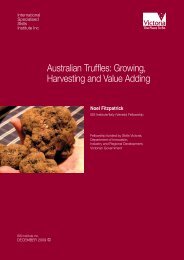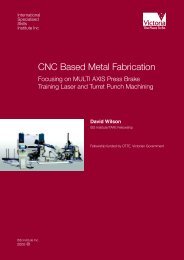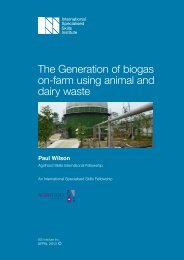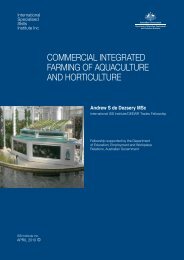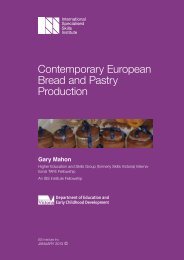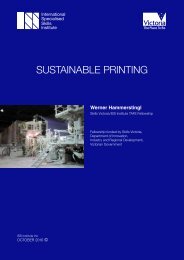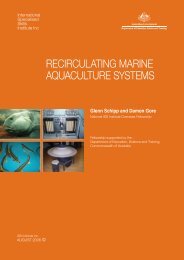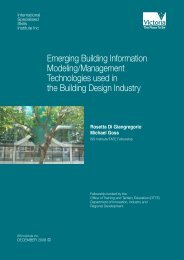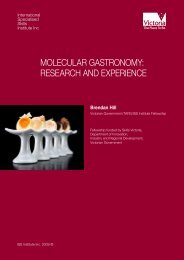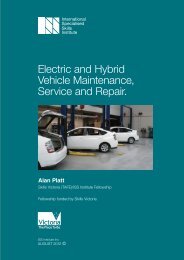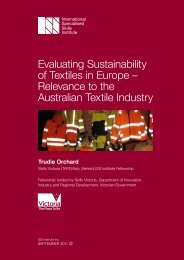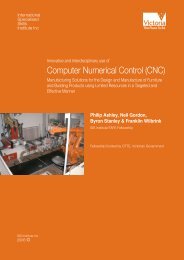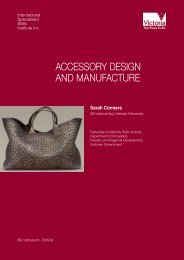contemporary techniques in architectural glass - International ...
contemporary techniques in architectural glass - International ...
contemporary techniques in architectural glass - International ...
Create successful ePaper yourself
Turn your PDF publications into a flip-book with our unique Google optimized e-Paper software.
Acknowledgments<br />
<br />
L<strong>in</strong>dy Sando and Vaughan Taylor would like to thank the follow<strong>in</strong>g <strong>in</strong>dividuals and<br />
organisations who gave generously of their time and their expertise to assist, advise and<br />
guide them throughout the Fellowship program.<br />
1.1 Award<strong>in</strong>g Body - <strong>International</strong> Specialised Skills Institute (ISS Institute)<br />
We know that Australia’s economic future is reliant upon high level skills and<br />
knowledge, underp<strong>in</strong>ned by design and <strong>in</strong>novation.<br />
The <strong>International</strong> Specialised Skills Institute Inc (ISS Institute) is an <strong>in</strong>dependent, national<br />
organisation, which has a record of nearly twenty years of work<strong>in</strong>g with Australian <strong>in</strong>dustry<br />
and commerce to ga<strong>in</strong> best-<strong>in</strong>-the-world skills and experience <strong>in</strong> traditional and lead<strong>in</strong>gedge<br />
technology, design, <strong>in</strong>novation and management. The Institute has worked extensively<br />
with Government and non-Government organisations, firms, <strong>in</strong>dustry bodies, professional<br />
associations and education and tra<strong>in</strong><strong>in</strong>g <strong>in</strong>stitutions.<br />
The Patron <strong>in</strong> Chief is Sir James Gobbo AC, CVO. The ISS Institute Board of Management<br />
is Chaired by Noel Waite AO. The Board comprises Franco Fiorent<strong>in</strong>i, John Iacovangelo,<br />
Lady Primrose Potter AC and David Wittner.<br />
Through its CEO, Carolynne Bourne AM, the ISS Institute identifies and researches skill<br />
deficiencies and then meets the deficiency needs through its Overseas Skill Acquisition Plan<br />
(Fellowship Program), its education and tra<strong>in</strong><strong>in</strong>g activities, professional development events<br />
and consultancy services.<br />
Under the Overseas Skill Acquisition Plan (Fellowship Program) Australians travel overseas or<br />
<strong>in</strong>ternational experts travel to Australia. Participants then pass on what they have learnt through<br />
reports, education and tra<strong>in</strong><strong>in</strong>g activities such as workshops, conferences, lectures, forums,<br />
sem<strong>in</strong>ars and events, there<strong>in</strong> ensur<strong>in</strong>g that for each Fellowship undertaken many benefit.<br />
As an outcome of its work, ISS Institute has ga<strong>in</strong>ed a deep understand<strong>in</strong>g of the nature<br />
and scope of a number of issues. Four clearly def<strong>in</strong>ed economic forces have emerged out<br />
of our nearly twenty years of research. The drivers have arisen out of research that has<br />
been <strong>in</strong>duced rather than deduced and <strong>in</strong>novative, practical solutions created - it is about<br />
th<strong>in</strong>k<strong>in</strong>g and work<strong>in</strong>g differently.<br />
A Global Perspective. ‘Skills Deficiencies’ + ‘Skills Shortages’<br />
Skill deficiencies address future needs. Skill shortages replicate the past and are focused<br />
on immediate needs.<br />
Skill deficiency is where a demand for labour has not been recognised and where accredited<br />
courses are not available through Australian higher education <strong>in</strong>stitutions. This demand is<br />
met where skills and knowledge are acquired on-the-job, gleaned from published material,<br />
or from work<strong>in</strong>g and/or study overseas. This is the focus of the work of ISS Institute.<br />
There may be <strong>in</strong>dividuals or firms that have these capabilities. However, <strong>in</strong>dividuals <strong>in</strong> the<br />
ma<strong>in</strong> do not share their capabilities, but rather keep the IP to themselves; and over time<br />
they retire and pass way. Firms likewise come and go. If Australia is to create, build and<br />
susta<strong>in</strong> Industries, knowledge/skills/understand<strong>in</strong>gs must be accessible trans-generationally<br />
through nationally accredited courses and not be reliant on <strong>in</strong>dividuals.<br />
Our <strong>in</strong>ternational competitors have these capabilities as well as the education and tra<strong>in</strong><strong>in</strong>g<br />
<strong>in</strong>frastructure to underp<strong>in</strong> them.<br />
Address<strong>in</strong>g skill shortages, however, is merely deliver<strong>in</strong>g more of what we already know and<br />
can do to meet current market demands. Australia needs to address the dual challenge<br />
– skill deficiencies and skill shortages.



